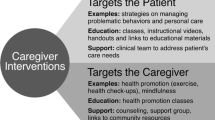Abstract
Care for older people with dementia living in the community involves not only a physician and the patient, but also a family member as the ‘primary caregiver’. This caregiver communicates medical information from the physician to the patient (screening this information as necessary), ensures that treatment plans are carried out, and relays patient (and family) concerns to the physician. Optimal patient care depends, in part, on inclusion of such caregivers in the dementia management team. However, review of the literature suggests that physicians do not make optimal use of family members as partners in disease management. Further research is required to assess the effect of efforts to include family caregivers as part of the dementia management team and to determine how best to support family members in their role as partners in dementia management.
Similar content being viewed by others
References
Haug M. Elderly patients, caregivers, and physicians: theory and research on health care triads. J Health Soc Behav 1994; 35: 1–12
Adelman R, Greene M, Charon R. The physician-elderly patient-companion triad in the medical encounter: the development of a conceptual framework and research agenda. Gerontologist 1987; 27: 729–34
Silliman RA. Caring for the frail older patient: the doctor-patient-caregiver relationship. J Gen Intern Med 1989; 4: 237–41
Greene MG, Majerovitz SD, Adelman RD, et al. The effects of the presence of a 3rd-person on the physician-older patient medical interview. J Am Geriatr Soc 1994; 42: 413–9
Madalie JH. The caregiver as the hidden patient: challenges for medical practice. In: Kahana E, Biegel DE, Wykle ML, editors. Family caregiving across the lifespan. Thousand Oaks (CA): Sage Publications, 1994: 312–30
Vitaliano PP, Russo J, Young HM, et al. Predictors of burden in spouse caregivers of individuals with Alzheimers’s disease. Psychol Aging 1991; 6: 392–402
Aneshensel CS, Pearlin LI, Mullan JT, et al. Profiles in caregiving: the unexpected career. New York: Academic Press, 1995
Schulz R, Os’Brien AT, Brookwala J, et al. Psychiatric and physical morbidity effects of Alzheimers’s disease caregiving: prevalence, correlates, and causes. Gerontologist 1995; 35: 771–91
Zarit SH, Stephens MAP, Townsend A, et al. Stress reduction for family caregivers: effects of adult day care use. J Gerontol Soc Sci 1998; 53: S267–S277
Lawton MP, Brody EM, Silverstein AR. Respite for caregivers of Alzheimer patients: research and practice. New York: Springer Publishing Company, 1991
Biegel DE, Song Li-Yu, Chakravarthy V. Predictors of caregiving burden among support group members of persons with chronic mental illness. In: Kahana E, Biegel DE, Wykle ML, editors. Family caregiving across the lifespan. Thousand Oaks (CA): Sage Publications, 1994: 178–215
Silliman RA, Bhatti S, Khan A, et al. The care of older persons with diabetes mellitus: families and primary care physicians. J Am Geriatr Soc 1996; 44(11): 1314–21
Medalie JH, Zyzanski SJ, Langa D, et al. The family in family practice: is it a reality? J Fam Pract 1998; 46(5): 390–6
Fortinsky RH, Leighton A, Wasson JH. Primary-care physicians’ diagnostic, management, and referral practices for older persons and families affected by dementia. Res Aging 1995; 17: 124–48
Hasselkus BR. Meaning in family caregiving: perspectives on caregiver-professional relationships. Gerontologist 1988; 28: 686–91
Albert SM, Pressley J, Merchant M, et al. Combining clinical and administrative databases to assess Alzheimers’s disease morbidity. Neurology 1999; 52 Suppl. 2: A127
Council on Scientific Affairs, American Medical Association. Physicians and family caregivers: a model for partnership. JAMA 1993; 269: 1282–4
Ikels C. The process of caretaker selection. Res Aging 1983; 5: 491–509
Albert SM, Moss M, Lawton MR The significance of the self-perceived start of caregiving. J Clin Geropsychol 1996; 2: 161–74
Albert SM. Caregiving as a cultural system: conceptions of filial obligation and parental dependency in urban America. Am Anthropol 1990; 92: 319–31
Schumacher KL, Stewart BJ, Archbold PG. Conceptualization and measurement of doing caregiving well. Image J Nurs Sch 1998; 30: 63–9
vom Eigen KA, Walker JD, Edgman-Levitan S, et al. Carepartner experiences with hospital care. Med Care 1999; 37: 33–8
Haley WE, Clair JM, Saulsberry K. Family satisfaction with medical care of their demented relatives. Gerontologist 1992; 32: 219–26
Barrett JJ, Haley WE, Powers RE. Alzheimers’s disease patients and their caregivers: medical care issues for the primary care physician. South Med J 1996; 89: 1–9
Cheok AS, Cohen CA, Zucchero CA. Diagnosing and managing dementia patients: practice patterns of family physicians. Can Fam Physician 1997; 43: 477–82
Brown CJ, Mutran EJ, Sloan PD, et al. Primary care physicianss’ knowledge and behavior related to Alzheimers’s disease. J Appl Gerontol 1998; 17: 462–479
Levinson W, Roter D. Physicianss’ psychosocial beliefs correlate with their patient communication skills. J Gen Intern Med 1995; 10: 375–9
Safran DG, Taira DA, Rogers WH, et al. Linking primary care performance to outcomes of care. J Fam Pract 1998; 47: 213–20
Greene MG, Adelman RD. Psychosocial factors in older patientss’ medical encounters. Res Aging 1996; 18: 84–102
Hansen P, Cornish P, Kayser K. Family conferences as forums for decision-making in hospital settings. Soc Work Health Care 1998; 27: 57–74
Sleath B, Svarstad B, Roter D. Physician vs patient initiation of psychotropic prescribing in primary care settings: a content analysis of audiotapes. Soc Sci Med 1997; 44: 541–8
Gafni A, Charles C, Whelan T. The physician-patient encounter: the physician as a perfect agent for the patient versus the informed treatment decision-making model. Soc Sci Med 1998; 47: 347–54
Author information
Authors and Affiliations
Corresponding author
Rights and permissions
About this article
Cite this article
Albert, S.M. The Caregiver as Part of the Dementia Management Team. Dis-Manage-Health-Outcomes 5, 329–337 (1999). https://doi.org/10.2165/00115677-199905060-00003
Published:
Issue Date:
DOI: https://doi.org/10.2165/00115677-199905060-00003




